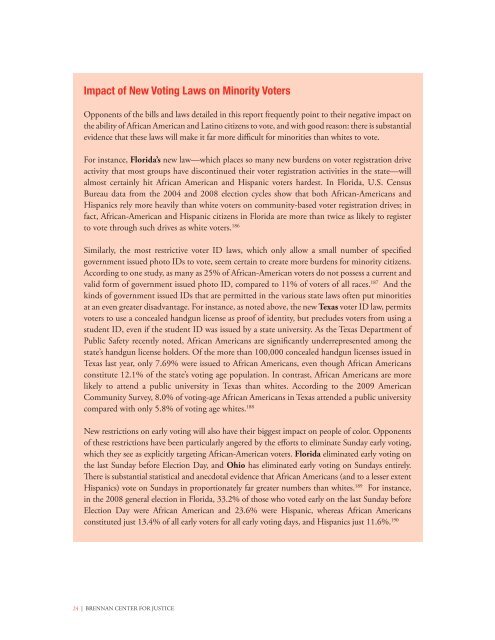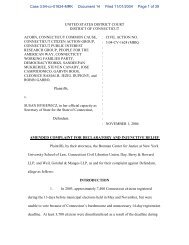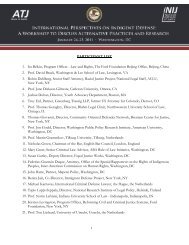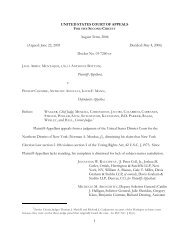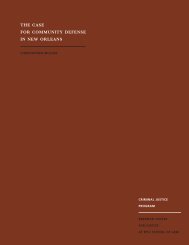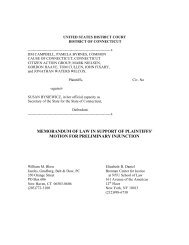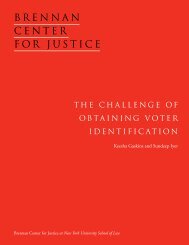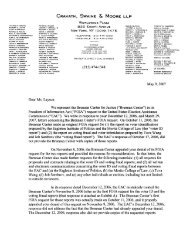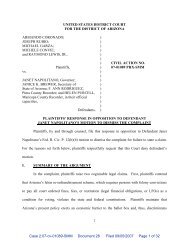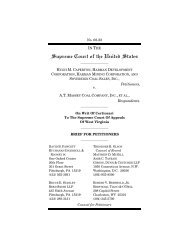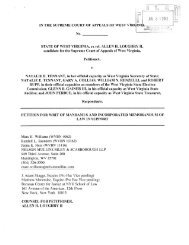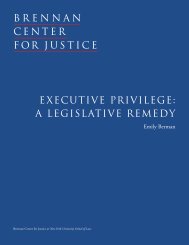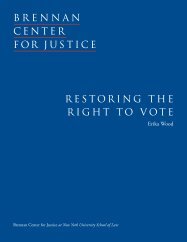BRENNAN CENTER FOR JUSTICE
BRENNAN CENTER FOR JUSTICE
BRENNAN CENTER FOR JUSTICE
You also want an ePaper? Increase the reach of your titles
YUMPU automatically turns print PDFs into web optimized ePapers that Google loves.
Impact of New Voting Laws on Minority Voters<br />
Opponents of the bills and laws detailed in this report frequently point to their negative impact on<br />
the ability of African American and Latino citizens to vote, and with good reason: there is substantial<br />
evidence that these laws will make it far more difficult for minorities than whites to vote.<br />
For instance, Florida’s new law—which places so many new burdens on voter registration drive<br />
activity that most groups have discontinued their voter registration activities in the state—will<br />
almost certainly hit African American and Hispanic voters hardest. In Florida, U.S. Census<br />
Bureau data from the 2004 and 2008 election cycles show that both African-Americans and<br />
Hispanics rely more heavily than white voters on community-based voter registration drives; in<br />
fact, African-American and Hispanic citizens in Florida are more than twice as likely to register<br />
to vote through such drives as white voters. 186<br />
Similarly, the most restrictive voter ID laws, which only allow a small number of specified<br />
government issued photo IDs to vote, seem certain to create more burdens for minority citizens.<br />
According to one study, as many as 25% of African-American voters do not possess a current and<br />
valid form of government issued photo ID, compared to 11% of voters of all races. 187 And the<br />
kinds of government issued IDs that are permitted in the various state laws often put minorities<br />
at an even greater disadvantage. For instance, as noted above, the new Texas voter ID law, permits<br />
voters to use a concealed handgun license as proof of identity, but precludes voters from using a<br />
student ID, even if the student ID was issued by a state university. As the Texas Department of<br />
Public Safety recently noted, African Americans are significantly underrepresented among the<br />
state’s handgun license holders. Of the more than 100,000 concealed handgun licenses issued in<br />
Texas last year, only 7.69% were issued to African Americans, even though African Americans<br />
constitute 12.1% of the state’s voting age population. In contrast, African Americans are more<br />
likely to attend a public university in Texas than whites. According to the 2009 American<br />
Community Survey, 8.0% of voting-age African Americans in Texas attended a public university<br />
compared with only 5.8% of voting age whites. 188<br />
New restrictions on early voting will also have their biggest impact on people of color. Opponents<br />
of these restrictions have been particularly angered by the efforts to eliminate Sunday early voting,<br />
which they see as explicitly targeting African-American voters. Florida eliminated early voting on<br />
the last Sunday before Election Day, and Ohio has eliminated early voting on Sundays entirely.<br />
There is substantial statistical and anecdotal evidence that African Americans (and to a lesser extent<br />
Hispanics) vote on Sundays in proportionately far greater numbers than whites. 189 For instance,<br />
in the 2008 general election in Florida, 33.2% of those who voted early on the last Sunday before<br />
Election Day were African American and 23.6% were Hispanic, whereas African Americans<br />
constituted just 13.4% of all early voters for all early voting days, and Hispanics just 11.6%. 190<br />
24 | Brennan Center for Justice


